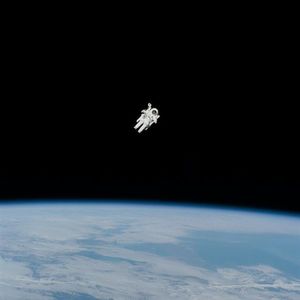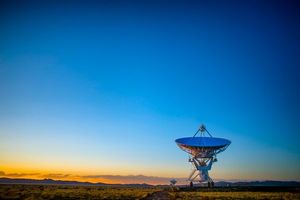Music, Automation, and Writing With a Satellite Mindset
By Peter Counter
Technology drained away my love of new music with the promise of access. That’s why I didn’t see it happening. Logging on to my subscription streaming service, I’m greeted with abundance—playlists of new releases, mixes generated to help me chase vibes, my most-played tracks. But inevitably, when I tap the Spotify icon on my phone, it’s to listen to something familiar. A big tech company gave me the keys to God’s music collection, and every time I peruse it, I’m drawn to what I already own on CD or vinyl. I used to blame this boring behaviour on getting old.
“You’ll never love music more than you loved your favourite band when you were sixteen.” This is a phrase I used when mourning my previous life as a music fan, dressing my toxic relationship with technology in sickly nostalgia. I remember the feeling of hearing a new CD for the first time and wanting to close my eyes to savour Jack White’s guitar tone, or Neko Case’s infectious hooks. A young man’s reaction. In my thirties, a new song from a new artist recommended by my trusty personal algorithm generally held the same visceral excitement as a news journalism podcast. Which was convenient—Spotify has those too. No need to unsubscribe.
“I’m getting old,” I thought, ritually sticking headphones in my ears to block out the rest of the world as I prepared to have the New York Times’ Michael Barbaro tell me about the politics of inflation, excited to see return on the investment of my listening time.
I missed music. But I had music. I felt cold. I felt disconnected. Drifting away from the colour and energy and high emotion of my favourite mode of art, I couldn’t see that my relationship with it had been mutated by the company I expected to keep my love alive. Music wasn’t supposed to feel this lonely.
(Image credit: NASA)
Ladies and Gentlemen We Are Floating in Space, the 1997 album by the band Spiritualized, is the last CD I was gifted as a recommendation. My best friend Sven gave it to me about twelve years ago. It was not an immediate favourite, despite Sven’s insistence that “This might be as important as OK Computer.” But because listening to music was part of our relationship, and because I wanted to feel what my friend felt, I tried to find the greatness in the record. I ripped the music onto my computer, loaded it on my iPod, and played Spiritualized on repeat. I’m still not sure I actually like the music, but I can admit it’s an important album, and listening to it connects me to a friend. Trying to enjoy music that doesn’t immediately grab you can be an act of love.
The Sven situation was not an isolated incident. That’s how music used to fit into my life. As an expression of community. Experiencing the art itself was only part of the experience, the bulk of which was secondary to the music. Reading interviews with artists, meeting people at concerts, talking about bands and wearing their t-shirts. Music was the connecting tissue to other people. To be a fan is not an isolated experience, and that’s because art is not a product. Art creates culture through us.
As a writer, I understand that my work is incomplete until it interacts with someone else. The words I type and refine into sentences, paragraphs, books, blog posts—they are reactive tablets that can only be activated when dropped into someone else’s mind. They expand when they come in contact with personal histories and imaginations that aren’t mine. The full picture of all art expands beyond the object, into the space of the audience. As a critic, I believe that expanded, intangible aspect of art as it interacts with an audience is just as interesting and important as the primary art object. Talking about music is part of loving music. And that’s why satellite radio rehabilitated my love of new tunes.
(Image credit: Donald Giannatti)
Defeated and grey, I figured I’d embrace my elderly status. Become a radio guy. That’s what happened to the previous generations, didn’t it? No room for them at the party, so they retreated to the familiar pavilions of classic rock and retro radio formats. Before embarking on a two-day drive to see family for the holidays, I subscribed to a satellite radio trial. My partner Emma and I figured the programming consistency would be helpful, especially as we drove through the signal wastelands of rural New Brunswick, Quebec, and Ontario. Almost immediately, I felt plugged back in.
Your CanLit News
Subscribe to Open Book’s newsletter to get local book events, literary content, writing tips, and more in your inbox
What we got wasn’t just music. We had companions. The DJs, unbound by terrestrial radio’s sponsored content demands and advertisement dependency, were actually talking about music. Presenting new stuff, reframing old stuff, giving their opinions on why a song mattered or what you should listen for to appreciate it. Why they liked it. Why they thought I’d like it too. Stories about the music, artist interviews, live mini-concerts. The feeling was counterintuitive. I gave up control of what I wanted to hear in favour of a human relationship and participation in a culture made of sharing. Not just sharing products, but sharing ourselves.
On the other side of my music enjoyment rehabilitation, it’s clear to me that the creative isolation I experienced in my streaming phase is an aspect of a larger conflict between tech automation and the art it exploits. Art is not product, but that’s how it’s curated for us. As I write this, creatives in all industries are under assault by the proponents of generative AI—a type of automation technology that can conjure art-like objects on demand. As lawsuits, strikes, and calls for regulation foment conflict between the greedy and the creative, I can’t help but think of how empty I felt when I simply consumed without connection, and how much lonelier I would feel surrounded by entertainment woven by the same kind of machine that dulled my greatest enjoyment.
The satellite signal guided me back to community, not though access, but through the acknowledgement and celebration that none of this matters if we treat creativity as an ends to objects of sensory pleasure. Art—and that includes writing—is about human connection, not instant gratification. It’s about sympathy, and you can't commiserate with a machine. The creative need for consolation is what inspires me to write, putting everything in its right place on this page, so that as old and isolated as I might feel, I can connect with you.
The views expressed in the Writer-in-Residence blogs are those held by the authors and do not necessarily reflect the views of Open Book.
Peter Counter is a culture critic writing about television, video games, film, music, mental illness, horror, and technology. He is the author of Be Scared of Everything: Horror Essays and his non-fiction has appeared in the Walrus, All Lit Up, Motherboard, Art of the Title, Electric Literature, and the anthology Empty the Pews: Stories of Leaving the Church. He lives in Dartmouth, Nova Scotia. Find more of his writing at peterbcounter.com and everythingisscary.com.



